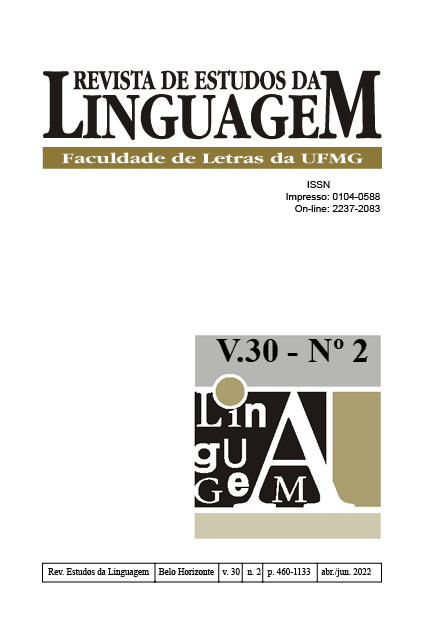Processamento, representação e variação do plural das palavras terminadas em ditongo oral decrescente do PB
DOI:
https://doi.org/10.17851/2237-2083.30.2.906-931Palabras clave:
processamento, representação, variação, plural de nomes, Modelos de ExemplaresResumen
Esse artigo aborda a alternância entre formas de plural de nomes cujo singular termina no ditongo oral decrescente terminado em -u, como em pneus ~ pneis, espanhóis ~ espanhous. O objetivo é contribuir para o entendimento dessa alternância no PB e também abordar questões relacionadas à competição de aspectos sociais e cognitivos na variação, processamento e representação de palavras complexas no léxico. Os dados foram obtidos através de um teste de produção elicitada com pseudopalavras e de coleta aleatória de produção espontânea (LABOV, 1972; SANKOFF, 2004). A análise foi conduzida com base nos pressupostos dos Modelos de Exemplares (BYBEE, 2010), segundo os quais as representações das formas das palavras no léxico são tanto detalhadas quanto abstratas (Pierrehumbert, 2012) e estão organizadas em redes baseadas em semelhança sonora e semântica. Ainda, padrões morfológicos emergem das representações no léxico, que são afetadas pela frequência de uso dos itens lexicais e pela frequência de tipo dos padrões emergentes. Os resultados do experimento mostraram que o efeito de restrições linguísticas, como o tamanho dos estímulos, de acordo com o número de sílabas, e o do núcleo do ditongo, está relacionado ao padrão de plural inferido pelo participante, que está altamente correlacionado ao seu nível de escolaridade. A comparação com resultado de outros estudos reforça o efeito da experiência sociolinguística do falante juntamente com a atuação de mecanismos cognitivos inatos. Os dados de produção espontânea confirmam a competição dos dois padrões de plural sobre as representações das palavras no léxico conforme observado nos dados experimentais.





